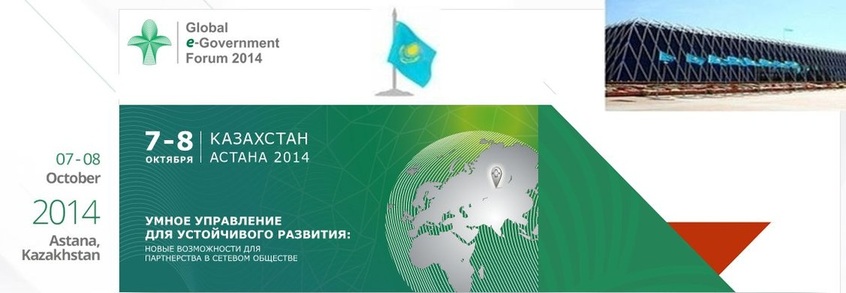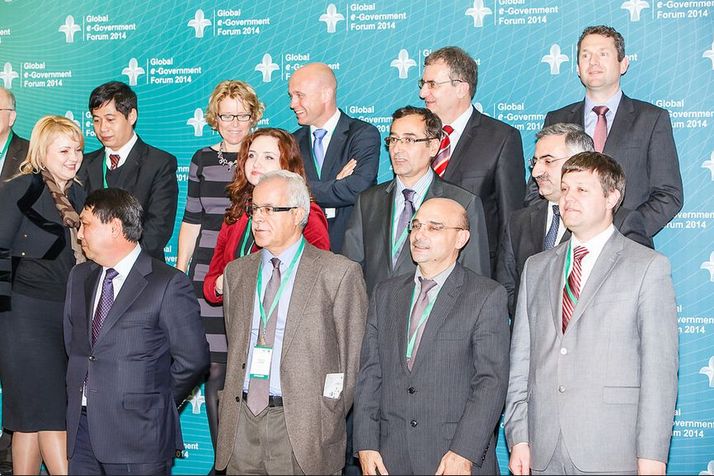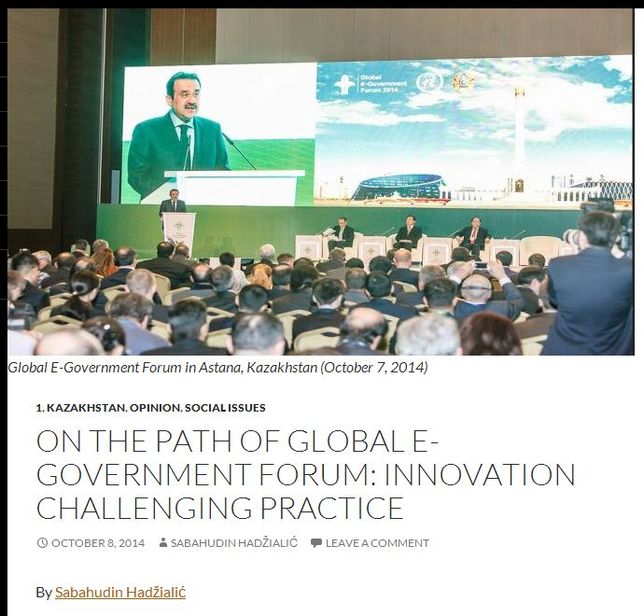|
NA LISTI Od 04.8.2010.g. /
LISTED SINCE August 4th, 2010 among leading European magazines: |
All Rights Reserved
Publishers online and owners: Peter Tase and Sabahudin Hadžialić, Whitefish Bay, WI, United States of America MI OBJEDINJUJEMO RAZLIČITOSTI... WE ARE UNIFYING DIVERSITIES |
8.10.2014
By Eurasia Review - Sabahudin Hadžialić
ON THE PATH OF GLOBAL E-GOVERNMENT FORUM:
INNOVATION CHALLENGING PRACTICE
Docendo discimus
(Astana, KAZAKHSTAN) — Yes, those words of Seneca’s (“We learn by teaching“) has found a fertile ground within Smart Governance in the sense of increasing the knowledge of emerging issues and trends in E-Government development, as well as the identification of innovative policies and practices.
But how do we actually “learn by teaching?” I dare say that during the first day of the Global E-Government Forum in Astana, Kazakhstan (October 7, 2014), through different sessions, “learning by teaching” has started.
The Forum kicked off with a Plenary Session that involved the Prime Minister of the Republic of Kazakhstan, Mr. Karim Massimov; Mr. Wu Hongbo, United Nations Under-Secretary-General for Economic and Social Affairs; Houlin Zhao, Deputy Secretary-General of ITU; Park Kyung Kuk, First vice minister of the Ministry of Security and Public Administration of Republic of Korea; Asset Issekeshev, Minister of Investment and Development and Stephen Tull, UN Resident Coordinator and UNDP Resident Representative in Kazakhstan.
To be more precise and concrete, in a methodological way, presentations from the key speakers were focused on Smart-Government: Science and Technology through the achieving of the main goal of the International Scientific –Practical Conference by determining the significance and role of new information and communications technology (ICT) trends and their adoption in the public sector to build Smart governments.
Three different sessions focused on:
1. Use of architectural approach in the public sector;
2. Smart convergence technologies
3. Data Science for Smart Government
This was followed by a workshop that centered on the Capacity Development for E-Participation: citizen engagement in policy development and decision making through information and communication technologies (ICT).
After the Nomination of the UN Awards on developing E-Government — that were spread all around the world, from Singapore to Bahrain, including Kazakhstan — a round table of ministers was conducted and after that more and more sessions ….
It was remarkable to see that this same issue of E-Government has been recognized by Governments from around the World — but that said, there is a very important problem, one that does exist regardless of cultural, historical and/or political issues within the various counties.
What is it?
The answer is simple, and visible, and rests on how to actually implement E-Government practices. As a matter of fact, since Plato’s time, the State has always placed pressure on its people, but we should now, instead, focus on a way to make that pressure less painful, if not in a ‘kinder’ way. That is the role of E-Government.
Frankly, I could not simply see within the first day of the Forum a proper way of integrating the excellent “know how“ that was espoused by all the presenters and key speakers and a practical, interacted way of how a Pro-Society works that will make people of each country of the World:
1. Capable to organize their lives in a way that will benefit both, the country and them – It is either one or the other.
2. Capable to be free of any kind of controlling influence of the paperwork. Who are the controllers of the controllers? Who will and might that be? Where are the independent people’s commissions and/or institutions free of influence of any state and/or party decision making that are dealing with E-governance? Yes, we have “independent“ public institutions within the countries, but…what does independence mean within the sense of influence feed-back within a society?
3. Capable for people to feel released not just from standing in long lines, but to make them to be more useful for the society and themselves.
4. Capable to make decisions which will improve their countries regardless of the ruling party(ies) and/or any kind of institutions that might be “above“ them.
We will wait for the second day of the Forum and see if it really is hard to be ‘human’ within human society — or is there another way around? — while at the same time trying to :learn through teaching” within the E-Government sessions.
By Eurasia Review - Sabahudin Hadžialić
ON THE PATH OF GLOBAL E-GOVERNMENT FORUM:
INNOVATION CHALLENGING PRACTICE
Docendo discimus
(Astana, KAZAKHSTAN) — Yes, those words of Seneca’s (“We learn by teaching“) has found a fertile ground within Smart Governance in the sense of increasing the knowledge of emerging issues and trends in E-Government development, as well as the identification of innovative policies and practices.
But how do we actually “learn by teaching?” I dare say that during the first day of the Global E-Government Forum in Astana, Kazakhstan (October 7, 2014), through different sessions, “learning by teaching” has started.
The Forum kicked off with a Plenary Session that involved the Prime Minister of the Republic of Kazakhstan, Mr. Karim Massimov; Mr. Wu Hongbo, United Nations Under-Secretary-General for Economic and Social Affairs; Houlin Zhao, Deputy Secretary-General of ITU; Park Kyung Kuk, First vice minister of the Ministry of Security and Public Administration of Republic of Korea; Asset Issekeshev, Minister of Investment and Development and Stephen Tull, UN Resident Coordinator and UNDP Resident Representative in Kazakhstan.
To be more precise and concrete, in a methodological way, presentations from the key speakers were focused on Smart-Government: Science and Technology through the achieving of the main goal of the International Scientific –Practical Conference by determining the significance and role of new information and communications technology (ICT) trends and their adoption in the public sector to build Smart governments.
Three different sessions focused on:
1. Use of architectural approach in the public sector;
2. Smart convergence technologies
3. Data Science for Smart Government
This was followed by a workshop that centered on the Capacity Development for E-Participation: citizen engagement in policy development and decision making through information and communication technologies (ICT).
After the Nomination of the UN Awards on developing E-Government — that were spread all around the world, from Singapore to Bahrain, including Kazakhstan — a round table of ministers was conducted and after that more and more sessions ….
It was remarkable to see that this same issue of E-Government has been recognized by Governments from around the World — but that said, there is a very important problem, one that does exist regardless of cultural, historical and/or political issues within the various counties.
What is it?
The answer is simple, and visible, and rests on how to actually implement E-Government practices. As a matter of fact, since Plato’s time, the State has always placed pressure on its people, but we should now, instead, focus on a way to make that pressure less painful, if not in a ‘kinder’ way. That is the role of E-Government.
Frankly, I could not simply see within the first day of the Forum a proper way of integrating the excellent “know how“ that was espoused by all the presenters and key speakers and a practical, interacted way of how a Pro-Society works that will make people of each country of the World:
1. Capable to organize their lives in a way that will benefit both, the country and them – It is either one or the other.
2. Capable to be free of any kind of controlling influence of the paperwork. Who are the controllers of the controllers? Who will and might that be? Where are the independent people’s commissions and/or institutions free of influence of any state and/or party decision making that are dealing with E-governance? Yes, we have “independent“ public institutions within the countries, but…what does independence mean within the sense of influence feed-back within a society?
3. Capable for people to feel released not just from standing in long lines, but to make them to be more useful for the society and themselves.
4. Capable to make decisions which will improve their countries regardless of the ruling party(ies) and/or any kind of institutions that might be “above“ them.
We will wait for the second day of the Forum and see if it really is hard to be ‘human’ within human society — or is there another way around? — while at the same time trying to :learn through teaching” within the E-Government sessions.
|
| ||||||||||||
Agenda
|
|
|
|
|
|
I - Previous article on Global E-Government Forum, 19.9.2014
II - Previous article on Global E-Government Forum, 4.10.2014.
III - Previous article on E- Government Forum, 7.10.2014.
IV - Previous article on Global E-Government Forum, 08.10.2014
Here are the photos as it comes online.
.

Copyright © 2014 Peter Tase & Sabahudin Hadžialić
Design: Sabi / Autors & Sabahudin Hadžialić. Design LOGO - Stevo Basara.
Freelance gl. i odg. urednik od / Freelance Editor in chief as of 2009: Sabahudin Hadžialić
All Rights Reserved. Publishers online and owners: Peter Tase & Sabahudin Hadžialić
Whitefish Bay, WI, United States of America
Contact Editorial board E-mail: [email protected];
Narudžbe/Order: http://www.diogenpro.com/diogen-all-in-one.html
Pošta/Mail USA: Peter Tase, 5023 NORTH BERKELEY BLVD. WHITEFISH BAY, WI, 53217, USA
Pošta/Mail BiH:Sabahudin Hadžialić, Grbavička 32, 71000 Sarajevo i/ili Dr. Wagner 18/II, 70230 Bugojno,
Bosna i Hercegovina
Design: Sabi / Autors & Sabahudin Hadžialić. Design LOGO - Stevo Basara.
Freelance gl. i odg. urednik od / Freelance Editor in chief as of 2009: Sabahudin Hadžialić
All Rights Reserved. Publishers online and owners: Peter Tase & Sabahudin Hadžialić
Whitefish Bay, WI, United States of America
Contact Editorial board E-mail: [email protected];
Narudžbe/Order: http://www.diogenpro.com/diogen-all-in-one.html
Pošta/Mail USA: Peter Tase, 5023 NORTH BERKELEY BLVD. WHITEFISH BAY, WI, 53217, USA
Pošta/Mail BiH:Sabahudin Hadžialić, Grbavička 32, 71000 Sarajevo i/ili Dr. Wagner 18/II, 70230 Bugojno,
Bosna i Hercegovina





